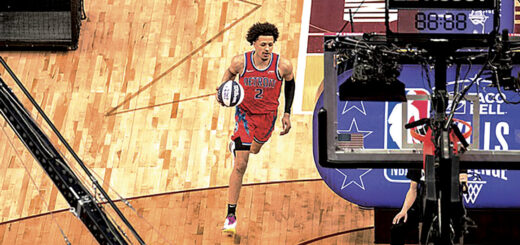Cougar Hockey vet Watson talks racism and Bill Peters

Fourth-year Cougar Hockey veteran Jamal Watson called the Akim Aliu allegation “shocking” during the Bill Peters story. Photo courtesy of MRU Cougars
By Dan Khavkin, Sports Editor
Third-year Cougars hockey player Jamal Watson had little doubt about the kind of comment former Calgary Flames head coach Bill Peters said to Akim Aliu ten years ago in the Rockford IceHogs’ locker room. A comment that prompted Peters to resign from the Flames, and has spurred players throughout the sport to come forward with their own stories of verbal, physical and emotional abuse.
“I knew exactly what he said, to a tee,” he says.
“I put Bill Peters[and racist allegations] together and I guessed what he was going to say. When my friends showed me the first reports I told my friends: ‘I promise you he came inside of the dressing room and said something about the music.’”
Surely enough, on the next day, reports piled on to confirm what Watson had thought.
According to Aliu in an interview with TSN, Peters had told him,“‘Hey Akim, I’m sick of you playing that n—– shit. I’m sick of hearing this n—–s fucking other n—–s in the ass stuff.”
“I said ‘yup, that’s the only thing a coach like that can get mad about,’” Watson recalls.
“Bill Peters crossed the line,” Watson claims. “The coach-player setting is a professional relationship just like it is in the business world… respect works both ways but the respect was lost.”
Watson is descended from a mixed family. His mother being white and father being black.
“You learn about ‘it’ early,” Watson explains, referring to the use of the n-word. “That’s obviously a word that doesn’t get used in any form of language. If you say it, it makes it ok for everyone else to say it. You don’t want that idea to go around.”
Watson says he only faced two counts of racism during his 20-year hockey career.
The first incident happened at 10-years-old in minor hockey when a player called Watson the n-word right to his face.
Watson remembers that it had no malice because like most kids, they understand that the word they use is hurtful but don’t grasp the extent and meaning of the insult.
“When things like that happen it’s ‘I don’t really understand what it means, I just know it’s hurtful so I’ll say it anyway? ‘You can get upset about it but you just move on and don’t get caught up in it,’” he says.
His second encounter was his worst, and still haunts him.
An opposing player hurled the derogatory slur during a major-midget AAA game against him at the age of 17.
“The worst part is that it was malicious. I’ll never forget when it happened. Someone else took the blame for it because the refs thought it was someone else but I knew that person so I went over and said ‘No, no, that’s a different guy.’”
The situation spiraled. A private-investigator got called to look into the situation.
As a result, the player at fault received a 10-12 game suspension Watson recalls.
He adds: “That kid doesn’t play hockey anymore. He was 17-years-old, from out of town and ignorant.”
“You get the apology in the mail but it don’t matter. If you say that inside of a hockey game, I don’t have time for that. There’s no remorse in that, you’re saying it to be hurtful and spiteful towards people.”
Since then, Watson hasn’t faced any issues in that regard.
He says the hardest part is when the guys who don’t care about what they say and who they hurt, win.
“It was very upsetting because you know of the 99.9 per cent of people who have dignity, who are respectful but when one person goes out of line, it’s shocking.”
Watson believes that it was a matter of time before the shift in the ‘closed-door’ hockey culture was going to change for the better.
And it all started with one story getting leaked.
He adds: “It’s good to see players be less fearful of their wild-wild-west coaches. The respect between players and coaches is so important to preserve the integrity of the game and the person.”
“Owners and coaches don’t own the player anymore, the players do.”
Aliu himself has compared his situation to the NFL’s Colin Kaepernick who famously began the movement of kneeling during the national anthem to protest police brutality. Watson agrees, saying that Aliu has opened the door to other players sharing their experiences, but that doesn’t lower the risk for players speaking out and being sent down into lower level leagues.
Watson adds: “Management can dust you aside because they would think you’re too much trouble. For him it’s a tough situation. You play all your life, you want to make the NHL, speaking out could take out the avenue of making the NHL. He weighed his options well at the time, it’s not worth saying it at the time.”
Watson believed Aliu did the right and that he would’ve done the same thing.
“He did do the right thing in my mind to say, ‘Hey what happened?’ even though it happened 10 years ago, that’s not correct. You can’t be politically-incorrect and be the leader of men or at the time kids and have that attitude. You don’t want that to be associated with your work-place,” he says.



